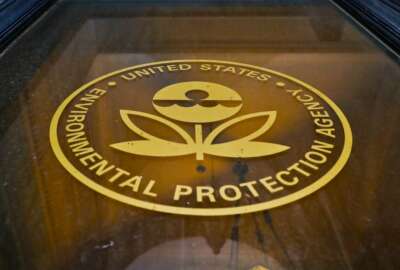
When it comes to pesticides permits, the EPA is supposed to be a stickler for the rules
EPA senior officials failed to follow standard operating procedures in 2018, when they signed off on permit renewals for certain pesticides. Including leaving...
Best listening experience is on Chrome, Firefox or Safari. Subscribe to Federal Drive’s daily audio interviews on Apple Podcasts or PodcastOne.
EPA senior officials failed to follow standard operating procedures in 2018, when they signed off on permit renewals for certain pesticides. Including leaving scientific documents out of the decision. For details, Federal Drive with Tom Temin turned to health scientist in the office of the inspector general at the EPA, Alton Reid.
Interview transcript:
Tom Temin: Mr. Reid, good to have you on.
Alton Reid: Thank you, Tom, nice to meet you.
Tom Temin: And what did you discover here is, first of all, is the signing off on renewals for permits for pesticides, something that is a regular occurrence at EPA?
Alton Reid: Well, that account of pesticide registration was mentioned in interviews related to a larger body of work that our office on it took on scientific integrity concerns. Based on those concerns. We conducted this evaluation to determine whether EPA policies and procedures were effective in addressing stakeholder issues. And by the way these concerns do they come from a whistleblower? I can’t really say anything much with that. That’s just a big policy.
Tom Temin: Okay. But anyway, you were alerted to this in some manner and decided to take a look at this particular issue. So what happened?
Alton Reid: That’s pretty complex, I want to try to simplify it as much as possible. EPA pesticide registration process essentially helps to ensure that any pesticide approved for use in the United States doesn’t have any unreasonable adverse effects on the environment as a broad mandate under the Federal Insecticide, Fungicide, and Rodenticide Act, also known as FIFRA. EPA scientists evaluate information from all kinds of sources. Some of those sources include academia, published scientific documents, other government agencies, and pesticide companies, EPA reviews data to determine whether to register a pesticide product for use or determine whether it’s specific restrictions are necessary on that product. Also, EPA can conditionally do registrations of pesticides, where the EPA can conditionally amend an existing registration to add an additional use. This occurs when the agency finds that it has satisfactory data pertaining to the proposed new use. Oh, and one last thing. EPA has an office of pesticide programs, which is responsible for overseeing the pesticide registration process. Within that office, there are certain procedures that should occur ahead of pesticide registration decisions. And what is the basic procedure for signing off on allowing a pesticide to be used? Well, when you approved pesticides, it goes through the registration process within the Office of pesticide programs within the EPA. The EPA has different divisions that do those type of registrations. There’s a registration division, division and an effect division, those different divisions work together and try to register products whenever they’re given to them. There’s a lot of people that have to have some say in that decision, correct?
Tom Temin: Yes, there’s multiple people who are involved. There’s different levels from senior managers to political appointees and scientists themselves. Yeah, so the scientists weigh in with what they know from scientific research and evidence, but it’s the political officials that actually do the sign off.
Alton Reid: Yes, there are political officials sometimes involved, but not always, in this case, with that camera, there was an administrative level official actually did look at the policies and procedures that were involved with this. And he did go through some of the documents, but that’s not typical. Got it.
Tom Temin: So were the documents then not properly considered in the sign off? Is that what happened in this particular case?
Alton Reid: It’s not the fact that documents weren’t necessarily properly considered. It’s just that in this particular case, there were documents given what they weren’t necessarily taken in the form that were given from the scientists. They were either changed or sources were either looked at a particular way that were more towards the appointed officials, policymakers and what they were looking at, if that makes sense.
Tom Temin: Yeah, it does. And so how were you able to discover this?
Alton Reid: Well, initially, we had some concerns that came about in an oil g setting where it was during, and it was a scientific integrity concern. But it was mentioned in a lot of larger body of work. In one of our interviews. We specifically had interviews with multiple scientists, and those scientists gave us different ideas of what was going on. And during those interviews, they explained some of the processes that were incorrect, or some of the processes they felt that were hampering the work specifically,
Tom Temin: Yes. In your report, you said we found that staff felt constrained or muted in sharing their concerns on the Dicamba registrations. And so that’s not the way scientists are supposed to feel at the EPA, because it’s constantly saying that it’s a scientifically driven organization, correct?
Alton Reid: Yes, that is correct.
Tom Temin: We’re speaking with Alton Reid. He’s a health scientist in the Office of the Inspector General at the EPA. And by the way, what is Dicamba? If I have the word, right? pesticides? What’s the significance of that particular type of pesticide?
Alton Reid: Well, Dicamba is a popular pesticide utilized within agricultural crops. It’s an herbicide actually. And it was registered in the United States in 1967. Because of its wide uses, that’s what makes it popular. And that’s what makes this particular interesting to a lot of advocacy groups and other groups that might be involved with Dicamba and its registration process.
Tom Temin: Yeah, so this is something that might be dropped from an airplane or sprayed out of some kind of farm equipment.
Alton Reid: Well, I can’t go into too much depth with that because there’s different uses. And that depends on the pesticide registration process and how the label works. But I wouldn’t say it’s dropped Have a plane. But there are over the top uses, which was something we kind of looked into when we were doing this investigation.
Tom Temin: I see so that this was a re registration or renewal of permission to use the stuff in the United States, because you said it’s been around since the 60s. So it has been used up until now.
Alton Reid: Yes, there was actually for us, we were looking at background information from the 2016 registration, but we specifically focused on the 2018 registration if they can, but
Tom Temin: Got it. And then this issue ended up in court, didn’t it?
Alton Reid: Yes, it actually did end up in court. And the Ninth Circuit Court of Appeals to be more specific, they vacated the three registrations that were done in 2018, because of issues that came about that we actually spoke about in our report.
Tom Temin: Okay, and what is the status of that registration at this point?
Alton Reid: Well, in 2020, they did approve of new registrations. But right now, with the registrations that are going on, and what we did in our report, we are working with the agency on recommendations that we ended up filing with them, and they’re going through a 60 day process with us. And we’re trying to find something or have a resolution process for corrective actions, looking at one recommendation in particular, which I’ll explain later. But that one recommendation with the agency, we’re trying to work with them to find something that kind of bounces our intent of original recommendations for what they’re doing right now, what they plan on doing.
Tom Temin: And just review the recommendations for us so we can understand what you think the agency ought to be doing differently.
Alton Reid: So basically, our recommendations are based off EPA deviating from typical procedures, and it’s 2018, that Canada registration decision. Our first recommendation has to do with senior policy managers and policymakers. We wanted them to document changes of scientific opinion, analyses and conclusions. And we wanted them to if there was anything changed inside of any of the documents they gave us, we want them to document any changes or any alterations that they were doing. Secondly, we recommended an assistant administrator level verification statement that has to do with scientific integrity policy, if anything was being done within a pesticide that actually made it to their desk, or they were doing anything relevant to what was going on with an immediate office, we wanted the assistant administrator to do a verification sign off of what was going on exactly. And lastly, we recommended annually conducting and documenting training for the staff. They’re involved, because we wanted to promote a commitment to scientific integrity policy, and promote a culture of scientific integrity.
Tom Temin: So basically, then to sum up the recommendations, you are looking for more accountability and transparency in the process. If someone changes a document or add something, you want to make sure everybody knows it. And that way, there’s no subterfuge going on.
Alton Reid: Yes, that’s correct. We really were looking more so to create a system of accountability and internal controls. And we definitely wanted the agency to be a little bit more transparent with anything that has to do with scientific integrity policy.
Tom Temin: And so far has the I guess there’s a new regime. They’re running EPA, since all this happened, and I imagine they accept those recommendations.
Alton Reid: Well, that goes to the process of speaking about earlier, they accepted two recommendations, the first one, and our third one within our report. The second one is the one that we’re still working with them with and they’re within a 60 day process with the agency right now in the OIG and we’re trying to like find that bounce foreign tenant recommendations within corrective actions.
Tom Temin: Alright, well, we’ll have to see how that one comes out. But in the meantime, Alton Reid is a health scientist in the Office of Inspector General at the EPA. Thanks so much for joining me.
Alton Reid: Appreciate it. Thank you for having me.
Copyright © 2025 Federal News Network. All rights reserved. This website is not intended for users located within the European Economic Area.
Tom Temin is host of the Federal Drive and has been providing insight on federal technology and management issues for more than 30 years.
Follow @tteminWFED
Related Stories

EPA wants to build cybersecurity-aware culture along with IT modernization




